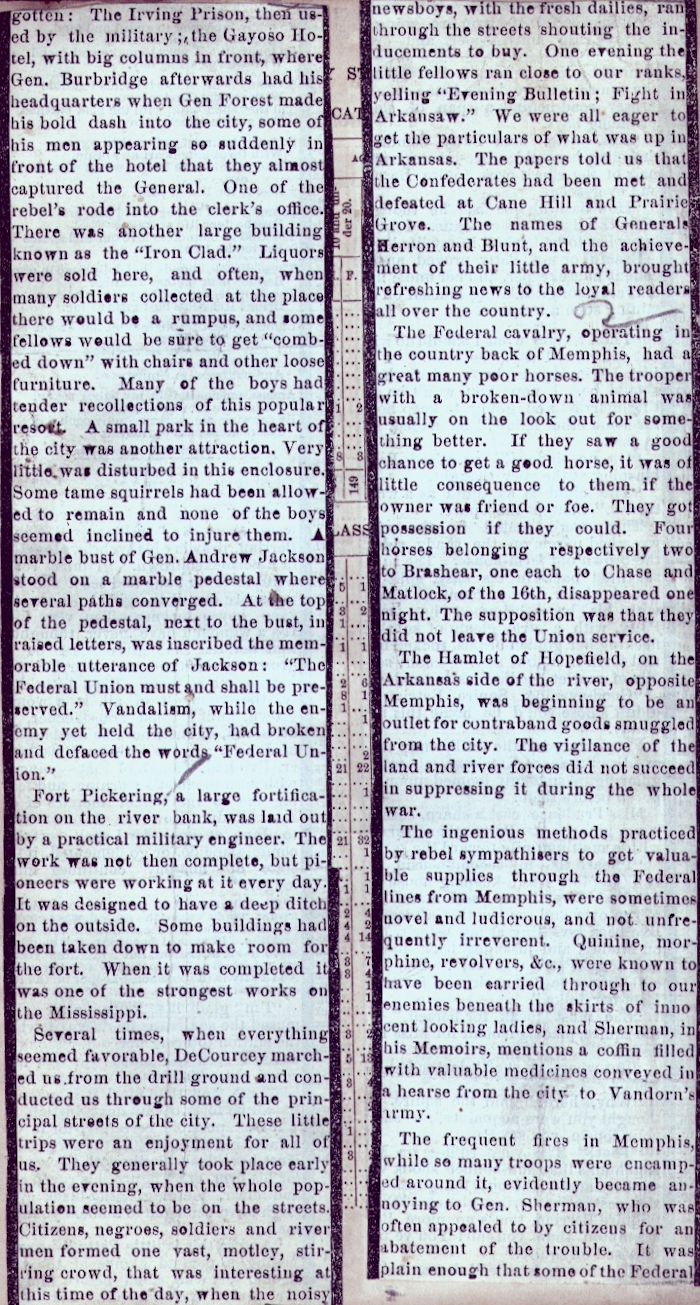| Camp & Field Page 49 | Camp & Field Index Page | 16th OVI Home Page | Camp & Field Page 51 |
The Camp & FieldArticles by Theodore Wolbach |
 Cpl. Theodore D. Wolbach |
The following image is taken from a book titled "Mortality and Statistics of the Census of 1850" in which it is believed retired Captain Rezin H. Vorhes, Company H, pasted over the pages a series of articles written by Cpl. Theodore D. Wolbach, Company E, titled "Camp and Field" and published, by chapter, in the Holmes County (Ohio) Republican newspaper from February 24, 1881 to August 17, 1882. The articles tell the story, in great detail and color, of the 16th OVI, from the inception of the 3-year regiment in October, 1861, through all its camps, battles and marches until it was disbanded on October 31, 1864. The articles pasted in the Vorhes book cover the first 35 chapters, published through October 20, 1881. All the remaining chapters were recently found in a Holmes County library by researcher Rob Garber who obtained copies, performed the transcriptions and provided to this website and which are also presented here, thus providing the complete work by Theodore Wolbach.
Throughout these articles click on the underlined white text for additional details.
The webauthor thanks 16th Ohio descendant Rob Garber for his excellent research on the Camp And Field articles and for performing the tedious digital transcription of those articles found on each page. The transcriptions were made to reflect the original articles verbatim, misspellings and all. Rob is the 3rd great nephew of Capt. William Buchanan, Company F, 16th Ohio, who served in the 90-day regiment as a private, re-enlisting in the three year regiment, and eventually making the rank of Captain of Company F. Thanks Rob!
Page 50 - Chapter 31 - November, 1862
 |
gotten: The Irving Prison, then used by the military; the Gayoso Hotel, with big columns in front, where Gen. Burbridge afterwards had his headquarters when Gen Forest made his bold dash into the city, some of his men appearing so suddenly in front of the hotel that they almost captured the General. One of the rebel's [sic] rode into the clerk's office. There was another large building known as the Fort Pickering, a large fortification on the river bank, was laid out by a practical military engineer. The work was not then complete, but pioneers were working at it every day. It was designed to have a deep ditch on the outside. Some buildings had been taken down to make room for the fort. When it was completed it was one of the strongest works on the Mississippi. Several times, when everything seemed favorable, DeCourcey marched us from the drill ground and conducted us through some of the principal streets of the city. These little trips were an enjoyment for all of us. They generally took place early in the evening, when the whole population seemed to be on the streets. Citizens, negroes, soldiers and river men formed one vast, motley, stirring crowd, that was interesting at this time of the day, when the noisy |
newsboys, with the fresh dailies, ran through the streets shouting the inducements to buy. One evening the little fellows ran close to our ranks, yelling The Federal cavalry, operating in the country back of Memphis, had a great many poor horses. The trooper with a broken-down animal was usually on the look out for something better. If they saw a good chance to get a good horse, it was of little consequence to them if the owner was friend or foe. They got possession if they could. Four horses belonging respectively two to Brashear, one each to Chase and Matlock, of the 16th, disappeared one night. The supposition was that they did not leave the Union service. The Hamlet of Hopefield, on the Arkansas side of the river, opposite Memphis, was beginning to be an outlet for contraband goods smuggled from the city. The vigilance of the land and river forces did not succeed in suppressing it during the whole war. The ingenious methods practiced by rebel sympathisers to get valuable supplies through the Federal lines from Memphis, were sometimes novel and ludicrous, and not frequently irreverent. Quinine, morphine, revolvers, &c., were known to have been carried through to our enemies beneath the skirts of innocent looking ladies, and Sherman, in his Memoirs, mentions a coffin filled with valuable medicines conveyed in a hearse from the city to Vandorn's army. The frequent fires in Memphis, while so many troops were encamped around it, evidently became annoying to Gen. Sherman, who was often appealed to by citizens for an abatement of the trouble. It was plain enough that some of the Federal |
| Camp & Field Page 49 | Camp & Field Index Page | 16th OVI Home Page | Camp & Field Page 51 |